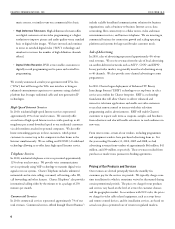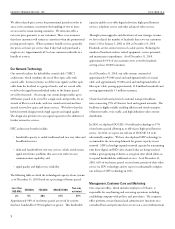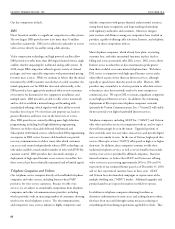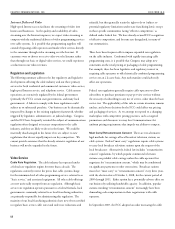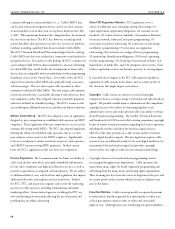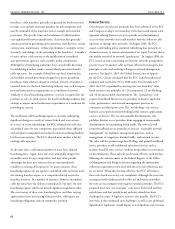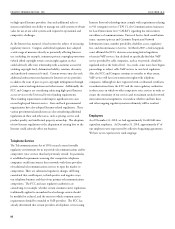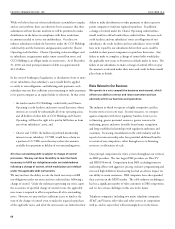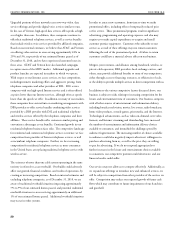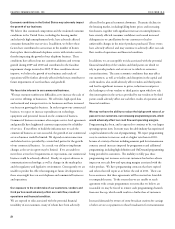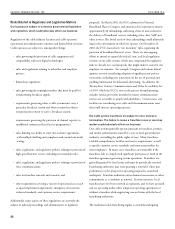Charter 2010 Annual Report Download - page 28
Download and view the complete annual report
Please find page 28 of the 2010 Charter annual report below. You can navigate through the pages in the report by either clicking on the pages listed below, or by using the keyword search tool below to find specific information within the annual report.
franchises, cable franchises generally are granted for fixed terms and
in many cases include monetary penalties for noncompliance and
may be terminable if the franchisee fails to comply with material
provisions. e specific terms and conditions of cable franchises
vary significantly between jurisdictions. Each franchise generally
contains provisions governing cable operations, franchise fees, system
construction, maintenance, technical performance, customer service
standards, and changes in the ownership of the franchisee. A number
of states subject cable systems to the jurisdiction of centralized
state government agencies, such as public utility commissions.
Although local franchising authorities have considerable discretion
in establishing franchise terms, certain federal protections benefit
cable operators. For example, federal law caps local franchise fees
and includes renewal procedures designed to protect incumbent
franchisees from arbitrary denials of renewal. Even if a franchise is
renewed, however, the local franchising authority may seek to impose
new and more onerous requirements as a condition of renewal.
Similarly, if a local franchising authority's consent is required for the
purchase or sale of a cable system, the local franchising authority may
attempt to impose more burdensome requirements as a condition for
providing its consent.
e traditional cable franchising regime is currently undergoing
significant change as a result of various federal and state actions.
In a series of recent rulemakings, the FCC adopted new rules that
streamlined entry for new competitors (particularly those affiliated
with telephone companies) and reduced certain franchising burdens
for these new entrants. e FCC adopted more modest relief for
existing cable operators.
At the same time, a substantial number of states have adopted
franchising laws. Again, these laws were principally designed to
streamline entry for new competitors, and they often provide
advantages for these new entrants that are not immediately
available to existing cable operators. In many instances, these
franchising regimes do not apply to established cable operators until
the existing franchise expires or a competitor directly enters the
franchise territory. In a number of instances, however, incumbent
cable operators have the ability to immediately “opt into” the new
franchising regime, which can provide significant regulatory relief.
e exact nature of these state franchising laws, and their varying
application to new and existing video providers, will impact our
franchising obligations and our competitive position.
Over the past several years, proposals have been advanced at the FCC
and Congress to adopt “net neutrality” rules that would require cable
operators offering Internet service to provide non-discriminatory
access to their networks and could interfere with the ability of cable
operators to manage their networks. In August 2005, the FCC
issued a nonbinding policy statement identifying four principles it
deemed necessary to ensure continuation of an “open” Internet that is
not unduly restricted by network “gatekeepers.” In August 2008, the
FCC issued an order concerning one Internet network management
practice in use by another cable operator, effectively treating the four
principles as rules and ordering a change in network management
practices. On April 6, 2010, the United States Court of Appeals
for the D.C. Circuit concluded that the FCC lacked jurisdictional
authority and vacated the FCC’s 2008 order. On December 21,
2010, the FCC responded by enacting new “net neutrality” rules
based on three core principles of: (1) transparency, (2) no blocking,
and (3) no unreasonable discrimination. e “transparency” rule
requires broadband Internet access providers to disclose applicable
terms, performance, and network management practices to
consumers and third party users. e “no blocking” rule restricts
Internet access providers from blocking lawful content, applications,
services, or devices. e “no unreasonable discrimination” rule
prohibits Internet access providers from engaging in unreasonable
discrimination in transmitting lawful traffic. e new rules will
permit broadband service providers to exercise “reasonable network
management” for legitimate management purposes, such as
management of congestion, harmful traffic, and network security.
e rules will also permit usage-based billing, and permit broadband
service providers to offer additional specialized services such as
facilities-based IP voice services, without being subject to restrictions
on discrimination. ese rules do not become effective until 60 days
following the announcement in the Federal Register of the Office
of Management and Budget’s decision regarding the information
collection requirements associated with the new rules which has not
yet occurred. When they become effective, the FCC will enforce
these rules based on case-by-case complaints. Although the new rules
encompass both wireline providers (like us) and wireless providers,
the rules are less stringent with regard to wireless providers. e FCC
premised these new “net neutrality” rules on its Title I and ancillary
jurisdiction, and that jurisdictional authority already has been
challenged in court. A legislative review is also possible. e FCC’s
new rules, if they withstand such challenges, as well as any additional
legislation or regulation, would impose new obligations and restraints



